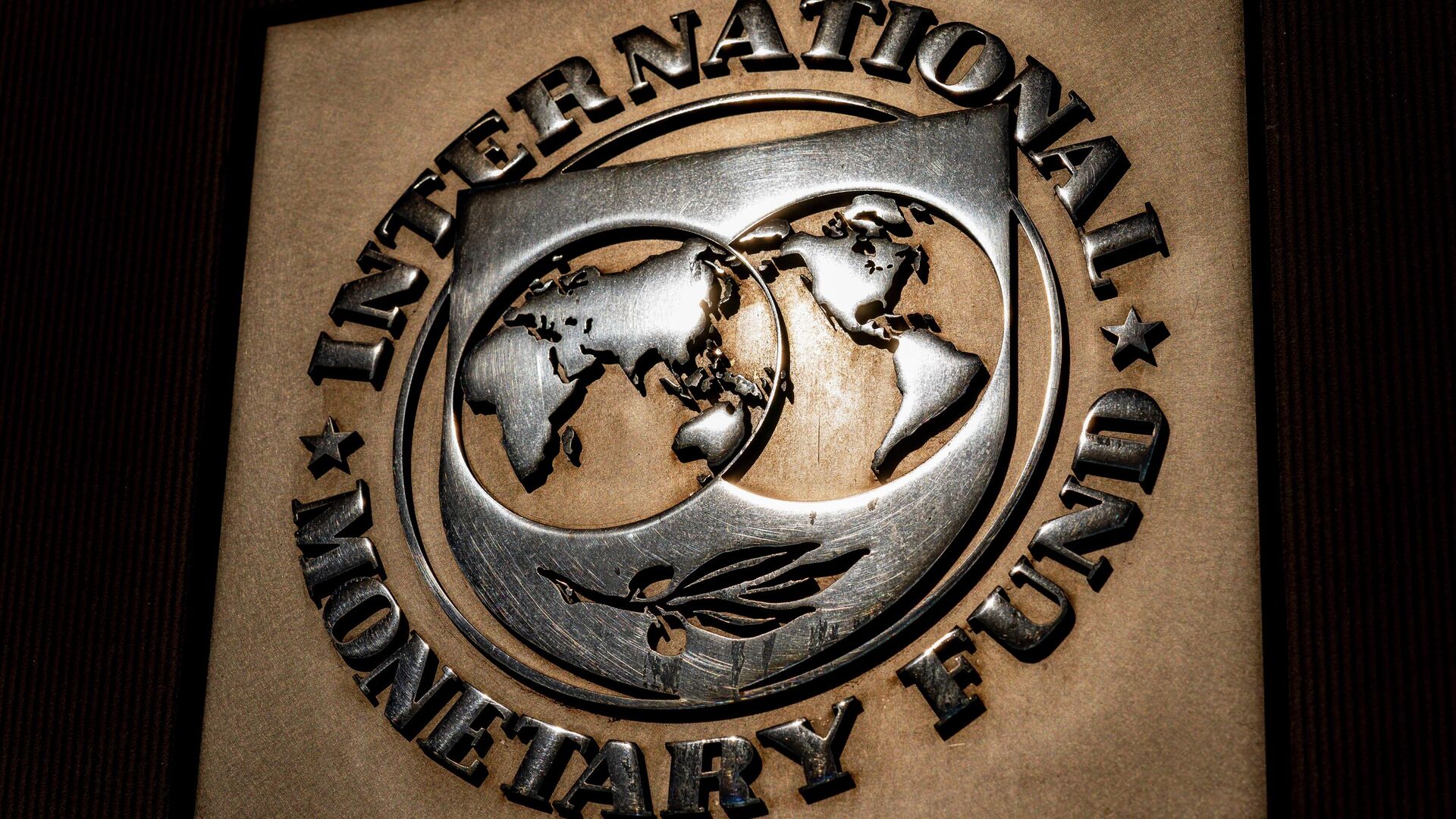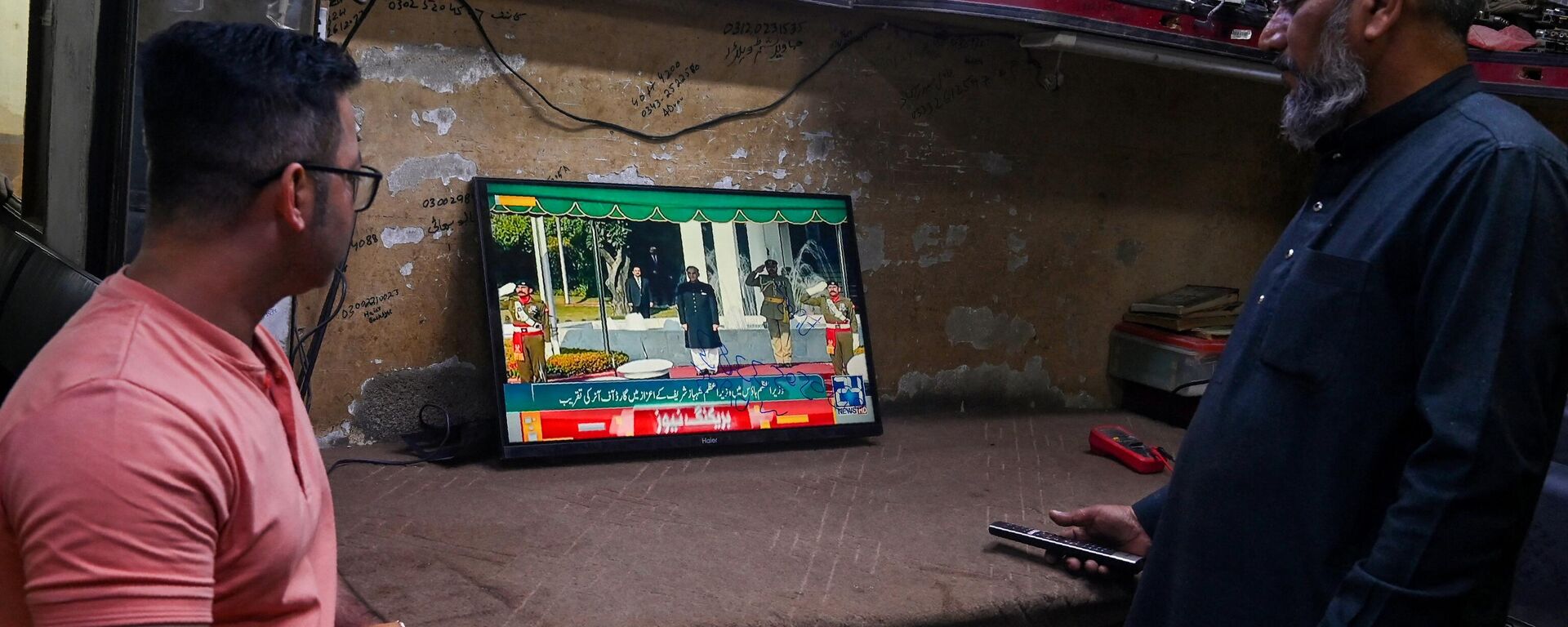https://sputniknews.in/20240523/pakistan-imf-deal-privatisation-or-asset-stripping-7425202.html
Pakistan-IMF Deal: Privatisation or Asset Stripping?
Pakistan-IMF Deal: Privatisation or Asset Stripping?
Sputnik India
Following the International Monetary Fund's (IMF) imposition of harsh conditions for receiving a bailout, Pakistan has decided to privatize its state-owned enterprises (SOEs).
2024-05-23T20:47+0530
2024-05-23T20:47+0530
2024-05-23T20:47+0530
sputnik opinion
shehbaz sharif
pakistan
bangladesh
india
pakistan international airlines (pia)
world bank
https://cdn1.img.sputniknews.in/img/07e7/07/13/3076975_0:160:3072:1888_1920x0_80_0_0_ab023bc83c37de620594cb8e9146fad1.jpg
The International Monetary Fund has requested that the federal government issue sukuk bonds on the stock market instead of borrowing money from the State Bank of Pakistan, ARY News has reported. Furthermore, the international financial organization recommended to Islamabad that market forces should determine the US dollar exchange rate, and that interest rates should be based on the prevailing inflation rate.However, last week, Prime Minister of Pakistan, Shehbaz Sharif, revealed the government's determination to sell all state-owned businesses while chairing a review meeting on underperforming SOEs. The demand for privatisation as a condition for a new loan package under the Extended Fund Facility (EFF) is reportedly spurred by the IMF's demand that Pakistan undergo a denationalization drive, as per ARY news.In 2006, the deregulation of the Pakistan Steel Mills was temporarily delayed by the nation's Supreme Court. However, it seems like a new round of public asset looting is on the horizon due to renewed demands for more denationalize from the International Monetary Fund (IMF) in order to secure a new loan package.Pakistan-IMF Deal Leads to PrivatisationAn Executive Director at the Center for South Asia & International Studies (CSAIS), Dr. Mehmood Ul Hassan Khan, told Sputnik that prolonged economic instability, low attraction of inflows of foreign direct investments, depletion of foreign reserves and last but not least, weak performance and ratios profitability of SOEs forced the government of Pakistan to denationalizе the "white elephants of the national treasury for so many years".Nevertheless, Prime Minister Sharif has released a comprehensive deregulation plan for the country's financially troubled State-Owned enterprises (SOEs) that will take effect from 2024 to 2029. He also declared in a statement that the profitable government companies would be denationalized in order to save public money.According to Ministry of Finance of Pakistan, SOEs incurred losses amounting to a staggering Rs1.395 trillion over the fiscal years 2021 and 2022. This figure is more than twice the size of the Public Sector Development Program (PSDP), bringing to light significant concerns regarding financial management and operational efficiency in the public sector, the expert highlighted. He bileves that, it is a better option for the incumbent government to denationalize all the SOEs and give a chance to the private sector to play its role in the macro-economy of the country.According to the International Monetary Fund, Pakistan's SOEs possess substantial assets, which made up 44% of the country's GDP as of 2019, but approximately 50% of these state companies, as per the IMF estimations, had a financial loss.Market analysts have observed that earlier efforts to denationalize these SOEs have faced challenges due to a lack of political dedication, as reported by Reuters earlier this month. Fawad Hasan Fawad, the former privatisation minister, told the news agency that companies engaged only in commercial operations cannot be considered strategic in character.Policy Failures: The Root Cause of Socioeconomic Woes?So now, here's the question: Does the problem lie with SOEs or other national socioeconomic and political factors creating obstacles for countries to break free from IMF bailouts and achieve economic progress?However, Pakistan's history of privatisation has been problematic. Between 1991 and 2006, the government sold 160 SOEs at low prices, leading to the collapse of 130 of these enterprises and the loss of 0.6 million jobs. In contrast, neighbouring countries like Bangladesh, India, and Iran have taken a self-reliant approach, distancing themselves from neocolonial practices.China, Vietnam and many other countries" have implemented "a successful model of the state ownership of SOEs. Successive political administrations miserably plundered the funds of these SOEs and resultantly these are now exposed to denationalization, he elaborated.Notwithstanding, SOEs in other South Asian countries like India, Iran, China, and Bangladesh, such as Biman Bangladesh Airlines, Petrobangla, Bangladesh Telecommunications Company Limited (BTCL), Oil and Natural Gas Corporation (ONGC), Steel Authority of India Limited (SAIL), have been able to maintain their market dominance, contribute to their respective countries' economic growth, and provide essential services to the public, but in Pakistan, story is different ironically.Ergo, another question comes to mind, "If Pakistan faces another economic crisis and seeks an IMF bailout, will the IMF demand the privatisation of Pakistan's nuclear arsenal as a condition for assistance?"
https://sputniknews.in/20240322/why-imf-deal-is-a-double-edged-sword-for-pakistans-economy-6904303.html
pakistan
bangladesh
india
Sputnik India
feedback.hindi@sputniknews.com
+74956456601
MIA „Rossiya Segodnya“
2024
Muhammad Sharif
https://cdn1.img.sputniknews.in/img/07e7/0b/05/5257054_0:0:443:444_100x100_80_0_0_b8bd2af32be62a6eecdb4a84c7fd978f.jpg
Muhammad Sharif
https://cdn1.img.sputniknews.in/img/07e7/0b/05/5257054_0:0:443:444_100x100_80_0_0_b8bd2af32be62a6eecdb4a84c7fd978f.jpg
News
en_IN
Sputnik India
feedback.hindi@sputniknews.com
+74956456601
MIA „Rossiya Segodnya“
Sputnik India
feedback.hindi@sputniknews.com
+74956456601
MIA „Rossiya Segodnya“
Muhammad Sharif
https://cdn1.img.sputniknews.in/img/07e7/0b/05/5257054_0:0:443:444_100x100_80_0_0_b8bd2af32be62a6eecdb4a84c7fd978f.jpg
pakistan, imf, shebaz sharif, bangladesh, world bank, india, china
pakistan, imf, shebaz sharif, bangladesh, world bank, india, china
Pakistan-IMF Deal: Privatisation or Asset Stripping?
Following the International Monetary Fund's (IMF) imposition of harsh conditions for receiving a bailout, Pakistan has decided to privatize its state-owned enterprises (SOEs).
The International Monetary Fund has requested that the federal government issue sukuk bonds on the stock market instead of borrowing money from the State Bank of Pakistan, ARY News has reported. Furthermore, the international financial organization recommended to Islamabad that market forces should determine the US dollar exchange rate, and that interest rates should be based on the prevailing inflation rate.
However, last week, Prime Minister of Pakistan, Shehbaz Sharif, revealed the government's determination to sell all state-owned businesses while chairing a review meeting on underperforming SOEs.
The demand for privatisation as a condition for a new loan package under the Extended Fund Facility (EFF) is reportedly spurred by the IMF's demand that Pakistan undergo a denationalization drive, as per ARY news.
In 2006, the deregulation of the Pakistan Steel Mills was temporarily delayed by the nation's Supreme Court. However, it seems like a new round of public asset looting is on the horizon due to renewed demands for more denationalize from the International Monetary Fund (IMF) in order to secure a new loan package.
Pakistan-IMF Deal Leads to Privatisation
An Executive Director at the Center for South Asia & International Studies (CSAIS), Dr. Mehmood Ul Hassan Khan, told Sputnik that prolonged economic instability, low attraction of inflows of foreign direct investments, depletion of foreign reserves and last but not least, weak performance and ratios profitability of SOEs forced the government of Pakistan to denationalizе the "white elephants of the national treasury for so many years".
"Even international monetary organizations like IMF and World Bank aggressively persuade Pakistan’s government to sell its SOEs for the reduction of subsidies. In this list PIA, Pakistan Steel Mills, First Women Bank, National High Way Authority, Power Generating Units and many other mega projects have been finalised to privatise. The denationalization of the services sector and entities has serious socio-economic and political setbacks and increasing political differences among the different stakeholders vividly reflect destructive consequences," the pundit explained.
Nevertheless, Prime Minister Sharif has released a comprehensive deregulation plan for the country's financially troubled State-Owned enterprises (SOEs) that will take effect from 2024 to 2029. He also declared in a statement that the profitable government companies would be denationalized in order to save public money.
According to Ministry of Finance of Pakistan, SOEs incurred losses amounting to a staggering Rs1.395 trillion over the fiscal years 2021 and 2022. This figure is more than twice the size of the Public Sector Development Program (PSDP), bringing to light significant concerns regarding financial management and operational efficiency in the public sector, the expert highlighted. He bileves that, it is a better option for the incumbent government to denationalize all the SOEs and give a chance to the private sector to play its role in the macro-economy of the country.
According to the International Monetary Fund, Pakistan's SOEs possess substantial assets, which made up 44% of the country's GDP as of 2019, but approximately 50% of these state companies, as per the IMF estimations, had a financial loss.
"To rescue the struggling economy, Pakistan's Prime Minister Shehbaz Sharif announced plans to privatise all state-owned enterprises, excluding strategic ones, in a sweeping move aimed at reducing the burden on the cash-strapped nation," he further added.
Market analysts have observed that earlier efforts to denationalize these SOEs have faced challenges due to a lack of political dedication, as reported by Reuters earlier this month. Fawad Hasan Fawad, the former privatisation minister, told the news agency that companies engaged only in commercial operations cannot be considered strategic in character.
Policy Failures: The Root Cause of Socioeconomic Woes?
So now, here's the question: Does the problem lie with SOEs or other national socioeconomic and political factors creating obstacles for countries to break free from IMF bailouts and achieve economic progress?
"I personally regard the weak performance, declining ratios of profitability, the lack of capacity building, corruption, ghost employment, wild discretions and the formation of cartels and cronies, the widening gap in manufacturing innovations and a lack of qualitative industrialisation, an inconsistency of industrial policy, [and] last but not the least decreasing competitiveness of the SOEs as the main reasons for their downfall," underscored Khan.
However, Pakistan's history of privatisation has been problematic. Between 1991 and 2006, the government sold 160 SOEs at low prices, leading to the collapse of 130 of these enterprises and the loss of 0.6 million jobs. In contrast, neighbouring countries like
Bangladesh, India, and
Iran have taken a self-reliant approach, distancing themselves from neocolonial practices.
China, Vietnam and many other countries" have implemented "a successful model of the state ownership of SOEs. Successive political administrations miserably plundered the funds of these SOEs and resultantly these are now exposed to denationalization, he elaborated.
Notwithstanding, SOEs in other South Asian countries like India, Iran, China, and Bangladesh, such as Biman Bangladesh Airlines, Petrobangla, Bangladesh Telecommunications Company Limited (BTCL), Oil and Natural Gas Corporation (ONGC), Steel Authority of India Limited (SAIL), have been able to maintain their market dominance, contribute to their respective countries' economic growth, and provide essential services to the public, but in Pakistan, story is different ironically.
Ergo, another question comes to mind, "If Pakistan faces another economic crisis and seeks an IMF bailout, will the IMF demand the privatisation of Pakistan's nuclear arsenal as a condition for assistance?"



